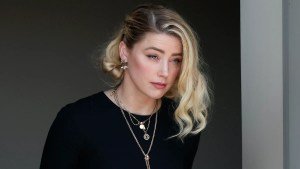Johnny Depp appears to be on a redemption tour, although the actor himself told The Times in an interview published Sunday that he is not launching a comeback because “I haven’t gone anywhere.”
Depp inevitably addressed his marriage and subsequent legal battle with ex-wife Amber Heard, at one point telling executive editor Jonathan Dean: “I was pre-Metoo. I was like a crash test dummy for Metoo. It was before Harvey Weinstein.”
Heard, who was married to Depp from February 2015 to January 2017, leveled allegations of abuse and assault against her ex-husband in 2016 after she filed for divorce. The New York Times published Ronan Farrow’s investigation into allegations against Weinstein in 2017.
Depp was asked about the people in his life who have testified against him or offered commentary and evidence to support Heart’s claims. “I’ll tell you what hurts. There are people, and I’m thinking of three, who have done me dirty. These people were at my kids’ parties. Throwing them in the air. And, look, I understand that people who couldn’t stand up [for me] because the scariest thing for them was to make the right choice. I was pre-Metoo. I was like a crash test dummy for Metoo. It was before Harvey Weinstein.”
“And I sponged it all up. And then I wanted from the hundreds of people I met in that industry to see who was playing it safe,” he added.
Depp then delivered a frequent politically conservative refrain: “You better wake up!”
In 2018, the Sun published an article about Heard’s allegations and the couple’s divorce, and referred to Depp as a wife beater. The actor sued executive editor Dan Wooton and Publisher News Group newspapers over Libel; he lost the case in 2020, with Justice Nicol concluding: “The vast majority of Depp’s alleged assaults have been proven.”
Depp sued Hear in Fairfax County, Virginia, after she wrote an op-ed for the Washington Post titled “I Spoke Out Against Sexual Violence — and Faced Our Culture’s Wrath.” Notably, this time around, Depp didn’t sue the Post or its publisher, but instead targeted his ex-wife. (If he had sued the Post, he would have had to prove that he knew Hear’s claims were false when they were printed.)
In her article, Heard wrote about the abuse she grew up with and the warnings she received against speaking out about the abuse she said she suffered as an adult. Heard did not mention Depp by name, or even that she was talking about anyone in the entertainment industry.
When Heard filed for divorce, she also requested a restraining order and $50,000 a month. The pair eventually reached a settlement and Depp agreed to pay $7,000, which she said she would donate to charity.
Years later, the pair’s trial has turned into a social media circus. One juror said, “There wasn’t enough evidence or evidence to really support what she was saying,” the Times reported, but contradicted himself by adding, “They were both abusive to each other.” Heard became the butt of many jokes and nasty comments.
“And what was abundantly clear during both trials was that Heard, a woman with far less money and significantly fewer fans than Depp, suffered more in court and in the court of public opinion than he did,” Dean noted. “I saw that at his trial in London. The mostly female crowd outside the court stood there for weeks to wave at Depp and scream death threats in his ears. She used to be his wife.”
Elsewhere in the interview, Depp also seemed to suggest that he got married because something about their dynamic reminded him of the relationship between his parents; the actor didn’t elaborate on his father’s treatment of his mother (he said his father and brother “would have fun”), but noted that his mother “was an amazing woman who turned out to be kind in the end, even though she didn’t know how to treat anyone when I was growing up.”
Read the full interview at the time .















